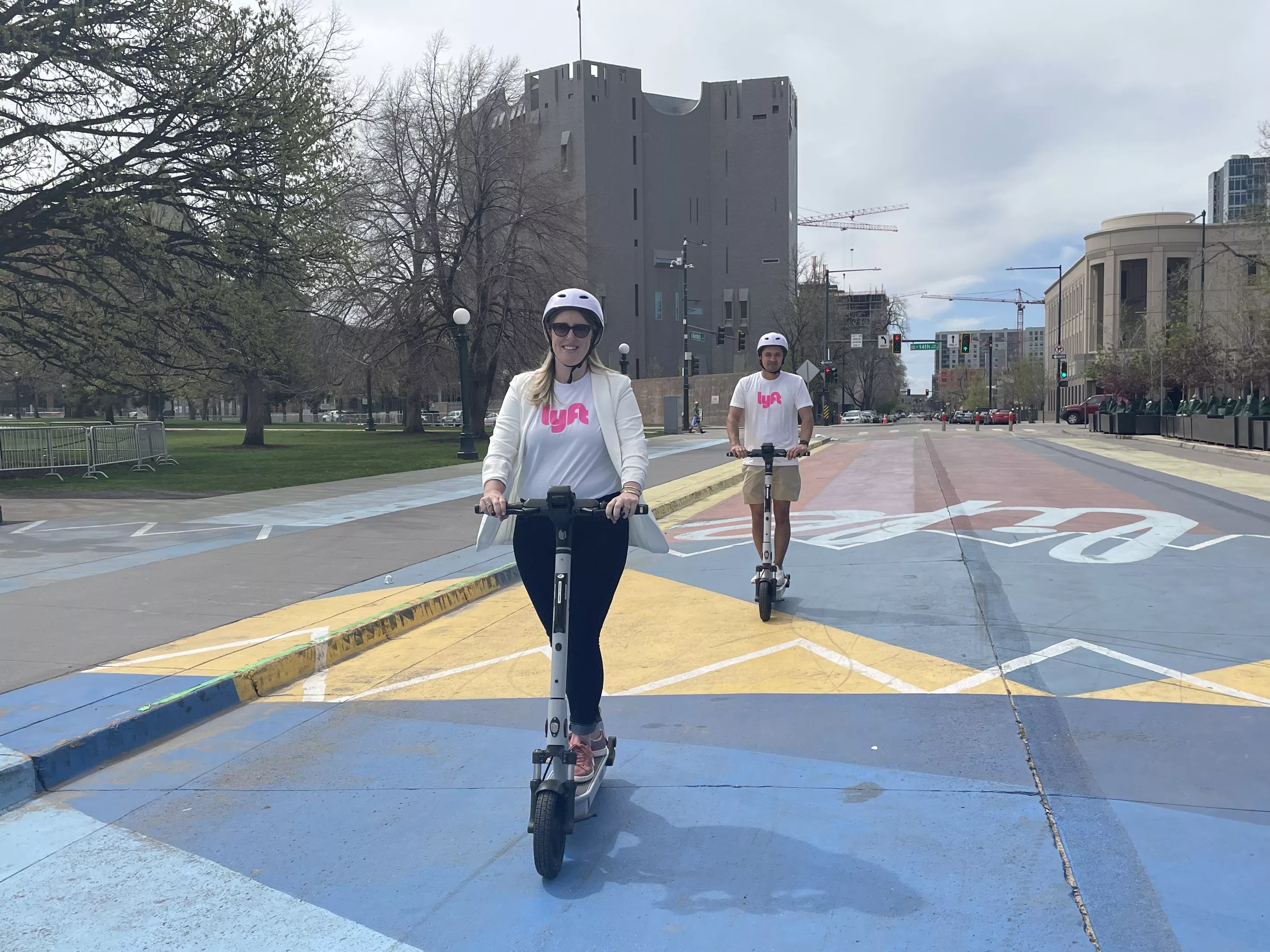
Catie Cheshire

Audio By Carbonatix
Six years after electric scooters first hit the streets, members of Denver City Council are discussing how to address the dangerous and illegal behavior that came with them.
The council’s Budget and Policy Committee met on Monday, August 5, to talk about potential policy proposals from Councilman Chris Hinds. He wants to crack down on prohibited conduct – such as riding e-scooters on sidewalks and parking scooters to block vehicle or pedestrian traffic – that occurs regularly downtown despite city laws against the behavior.
“Pedestrians feel unsafe on sidewalks,” Hinds said during the meeting. “People are calling scooter riders reckless, careening down the sidewalk at 15 miles per hour. Or there’s scooter litter lying around on our sidewalks or streets or right-of-way or curb ramps. Conversely, riders feel unsafe on streets.”
Hinds pointed to lack of enforcement as a primary issue, noting that Denver’s laws on e-scooter use are largely ignored by riders and city officials alike. Denver police have issued only nine citations for improper scooter usage since 2018, compared to over 18.3 million e-scooter trips in the city during that time frame, according to Denver County Court records.
“We just have rules for fun, apparently,” Councilwoman Flor Alvidrez commented.
The city has also issued zero citations to its e-scooter vendors, Lyft and Lime, Hinds said, adding that the companies have not lived up to their contractual obligations with the city. The vendors were each required to install 100 parking corrals in 2021, but one of the vendors just completed the 100th installation a few weeks ago, three years after the deadline.
“Talking about the scale of obstructions, it’s everywhere,” Hinds said. “We don’t charge the scooter vendors anything. … We are taking the people’s right-of-way and we are giving it to two private, for-profit companies, and we’re getting nothing in return.”
Hinds had told Westword he was considering a fine structure for the e-scooter vendors, fining the companies when riders use their scooters improperly. But during this meeting, there was little discussion of fines; talk instead centered on the specific methods that council could pursue to get e-scooters off of the sidewalk when in use and out of the way when parked.
Proposals included requiring sidewalk detection technology, expanding the geofencing used to automatically slow or stop scooters on the 16th Street Mall and in McGregor Square, and asking vendors to implement their own enforcement mechanisms. The members also discussed charging riders for parking in the right-of-way, fining vendors for each scooter parked improperly, and conducting an audit of the end-of-ride photos riders send to the Lyft and Lime apps.
Council President Amanda Sandoval touched on one nuance of the sidewalk-riding issue, admitting that she has ridden e-scooters on the sidewalk because of safety concerns about riding on the street.
“I knew I was breaking the rules, but I was not going to go into traffic,” Sandoval said. “Twentieth Street is not safe. How else am I supposed to get [to Coors Field] when you go underneath the consolidated rail line and there’s not a protected bike lane? … That is a policy decision I think we also have to look at. When there’s not a safe, designated bike lane, what are we supposed to do?”
City law requires e-scooters to be ridden in a bike lane or on the right-hand side of a roadway.
Denver lacks specific data on the safety of riding in the street versus on the sidewalk, but Denver Health registered 1,449 patient encounters attributed to scooter injuries in 2023 – nearly four each day of the year – including duplicates for patients who visited multiple care facilities for the same injury and mobility scooter injuries. Orthopedic injury admissions at Denver Health increased by 540 percent in the two years after e-scooters were introduced in the city, compared to the two years before, according to a 2022 study.
Sandoval also lamented the poor management of e-scooters in the city, noting that she constantly sees scooters in the Platte River outside of her office. She gave up on calling to report the scooters in the river because “they just stay there forever,” she said.
“There is a responsibility for privately owned companies,” Councilman Darrell Watson added. “We as a city have been extremely relaxed in holding responsibility for right-of-way.”
No policy drafts were brought forward during the meeting and no official action was taken. Hinds committed to continuing his research, including looking into how much revenue the city could gain by enforcing its e-scooter laws and contracts, and determining the cause of required corral delays.
No one from Lyft, Lime or the Denver Department of Transportation and Infrastructure spoke at the meeting, but Lime sent this statement from Hayden Harvey, director of Government Relations: “Denver has become a national leader in micromobility and that success is built on the strong partnership we have with the city, the community, and local leaders, plus the support we have from our millions of riders. As ridership has boomed since the pandemic, we’ve invested heavily in safe riding and proper parking and we’re always working to do even more. We take special pride in listening to feedback from the community and taking action to improve things immediately. Safe riding and proper parking were already our number-one priority and we will redouble our efforts with this feedback in mind, bearing in mind that 99.99 percent of our rides are taken without reported incident. This year we’re building 150 more parking corrals with vertical signage that will make them easier to find, we’re installing Mandatory Parking Zones in key areas, and we’re working on enhanced, AI-assisted technology to continue cracking down on sidewalk riding and check end trip photos to ensure properly parked vehicles.”
This story has been updated to include the statement from Lime.